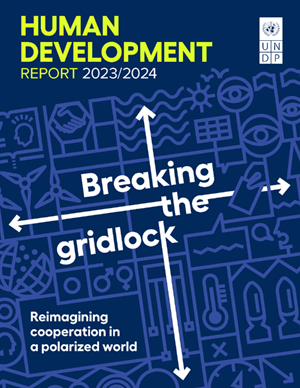The 2023/24 Human Development Report (HDR), titled “Breaking the Gridlock: Reimagining cooperation in a polarized world", reveals a troubling trend: the rebound in the global Human Development Index (HDI) – a summary measure reflecting a country’s Gross National Income (GNI) per capita, education, and life expectancy – has been partial, incomplete, and unequal.
 |
| Source: UNDP |
The HDI is projected to reach record highs in 2023 after steep declines during 2020 and 2021. But this progress is deeply uneven. Rich countries are experiencing record-high levels of human development while half of the world’s poorest countries remain below their pre-crisis level of progress.
Viet Nam's HDI value for 2022 is 0.726, positioning it at 107 out of 193 countries and territories. Between 1990 and 2022, Viet Nam's HDI value changed from 0.492 to 0.726, an improvement of nearly 50 percent. In the 1990s when UNDP introduced the HDI, Viet Nam was at the relatively lower end of the ranking, but now Viet Nam is in the middle of the ranking, having made consistent progress over the past 30 years.
“Viet Nam has remained a high human development country through the difficult years of the Covid-19 pandemic. Human development continues to be a focus of Viet Nam’s development strategy, and we have seen very sizable gains over the past decades,” said UNDP Resident Representative Ramla Khalidi. Viet Nam ranks 91 out of 166 countries in the Gender Inequality Index, which considers inequality across three dimensions of reproductive health, empowerment and the labor market. “Viet Nam has done well in some respects, for example access to education and labor force participation, however a persistent gender division of labor reserves more stable, highly paid jobs for men, and women still account for a small share of leadership roles in Government, the National Assembly and in the private sector,” she said.
Globally inequalities are compounded by substantial economic concentration. As referenced in the report, almost 40 percent of global trade in goods is concentrated in three or fewer countries; and in 2021 the market capitalization of each of the three largest tech companies in the world surpassed the Gross Domestic Product (GDP) of more than 90 percent of countries that year.
“The widening human development gap revealed by the report shows that the two-decade trend of steadily reducing inequalities between wealthy and poor nations is now in reverse. Despite our deeply interconnected global societies, we are falling short. We must leverage our interdependence as well as our capacities to address our shared and existential challenges and ensure people’s aspirations are met,” said Achim Steiner, head of the UN Development Programme. “This gridlock carries a significant human toll. The failure of collective action to advance action on climate change, digitalization or poverty and inequality not only hinders human development but also worsens polarization and further erodes trust in people and institutions worldwide.”
The report highlights that deglobalization is neither feasible nor realistic in today’s world and that economic interdependence remains high. It points out that no region is close to self-sufficiency, as all rely on imports from other regions of 25 percent or more of at least one major type of goods and services.
The report emphasizes how global interdependence is being reconfigured and calls for a new generation of global public goods. It proposes four areas for immediate action; planetary public goods, for climate stability, as we confront the unprecedented challenges of the Anthropocene; digital global public goods, for greater equity in harnessing new technologies for equitable human development; new and expanded financial mechanisms, including a novel track in international cooperation that complements humanitarian assistance and traditional development aid to low-income countries; and dialing down political polarization through new governance approaches focused on enhancing people's voices in deliberation and tackling misinformation.
In this context, multilateralism plays a fundamental role, the report argues, because bilateral engagements are not able to address the irreducibly planetary nature of the provision of global public goods./.